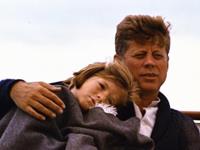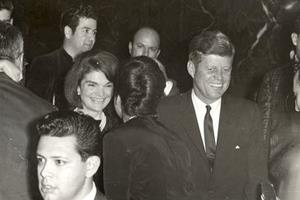Fifty years ago this month (Nov. 22, 1963), America’s youngest elected and most debonair president was gunned down in Dallas. It is a fitting occasion for television retrospectives on the Kennedy presidency, and the industry is delivering. Some of the specials are crassly exploitative and vacuous, but we expect substance and balance from PBS’s stalwart American Experience franchise, which presents a new two-part JFK documentary this week.
Do we get it? Sort of.
There’s no escaping the youth, vigor, and glamour of John Fitzgerald (“Jack”) Kennedy and Jacqueline Bouvier (“Jackie”) Kennedy. Pop writers and filmmakers have long drooled over the “Camelot” White House, which Jackie redecorated in refined Americana, with an eye to high European (especially French) culture. Making television history in 1962, she escorted reporter Charles Collingwood – and millions of smitten Americans – through an hour-long White House tour.
 The extended Kennedy clan – from patriarch Joseph P. Kennedy and his nine children (including Jack, Bobby, and Ted) to Jack’s own children – were staggeringly photogenic, thanks both to their natural endowments and to careful posing. This, combined with JFK’s prolific and compulsive womanizing, war heroism, and chronic health problems, amounts to a soap opera dynasty … but one with lots of style.
The extended Kennedy clan – from patriarch Joseph P. Kennedy and his nine children (including Jack, Bobby, and Ted) to Jack’s own children – were staggeringly photogenic, thanks both to their natural endowments and to careful posing. This, combined with JFK’s prolific and compulsive womanizing, war heroism, and chronic health problems, amounts to a soap opera dynasty … but one with lots of style.
Part I of PBS’s JFK (shown Monday and Tuesday nights at 9 p.m. ET; check local listings) covers Jack’s upbringing and pre-White House career. This series remains true to the American Experience format of rich visuals, somber narration, and talking heads. Producer/director Susan Bellows has assembled a strong cast of experts, and the original score by Joel Goodman is haunting by unobtrusive.
Few of the key political contemporaries of JFK were still alive to be filmed, but the roster of Kennedy biographers, especially those with university appointments and scholarly credentials, is strong. Robert Dallek, who has also written extensively about FDR, LBJ, Truman, and other presidents, is chief consultant and lead talking head for the series. He is joined by famed Robert Moses and LBJ biographer Robert Caro. (Dallek wins the Heavier New York Accent contest, but not by much; too bad none of these historians sports a Boston brogue.) Timothy Naftali, a noted scholar of the Cold War, lends another valuable voice. We should thank Bellows for not wheeling in the vacuous Michael Beschloss and Douglas Brinkley, as the major networks do much too often.
The oldest Kennedy son, Joe, Jr., was groomed for the presidency, but died on a World War II combat mission. By then, Jack was a war hero, too. After his P.T. boat was sliced in half by a Japanese destroyer, he swam miles to shore with an injured crew member in tow. The injuries Kennedy sustained in that ordeal added to a long list of medical maladies he would endure in his short, eventful life, most notably Addison’s disease. It was no small irony that the ever-smiling Kennedy spent most of his days in excruciating pain, masked by steroids and other drugs, unaided by surgery, and hidden from public view.
Although Joe Kennedy at first doubted that Jack possessed the stamina for politics, he nevertheless threw the full force of his financial and political clout behind his second son’s political aspirations. The program grows threadbare at this stage.
First, it inexplicably treats the family patriarch with kid gloves, referring to the source of his fortune simply as “high finance,” when in fact much of it derived from importing liquor from Europe after Prohibition (and, according to some biographers, probably before, a.k.a. bootlegging). As U.S. Ambassador to the United Kingdom from 1938 to late 1940, Joseph P. Kennedy supported Prime Minister Neville Chamberlain’s efforts to avoid war in the face of Hitler’s invasions and escalating demands. Like Chamberlain, Kennedy fell into disgrace because of his position as a Nazi “appeaser.” JFK never uses the term to refer to father or son. For his part, Jack (with his father’s financial support, as always) published his Harvard thesis as his first book, Why England Slept, but over time moved away from his father’s stance. The series gives a convoluted version of this painful episode. Later, it makes no reference to Joseph Kennedy’s widely alleged efforts to buy votes and otherwise rig the presidential election in favor of his son.
Even more disturbing is Part I’s nearly complete lack of attention to the substance of politics. We learn that JFK, as a U.S. congressman, then senator, from Massachusetts, was inspired by the Algerian War for Independence against France, which of course would be echoed in Vietnam. But on the domestic side, there is no hint of what JFK stood for as a candidate or in Congress – not one platform issue, not one cause, not a word. Just the handsome wounded soldier shaking hands dawn to dusk, and hopping into the sack with women usually not his wife.
Fortunately, Part II, on the presidential years, corrects this glaring omission. Some viewers may be surprised by all the attention to foreign relations, but American Experience gets that right.
Kennedy’s first year in the White House was mostly disastrous, thanks especially to the ill-fated Bay of Pigs invasion, which left Castro in power and deeply embarrassed the new administration. The historical footage assembled and edited for this segment is riveting – my favorite part of the four hours. Cuber, as Jack Kennedy pronounced it, remained a thorn in his side, and nearly brought our hemisphere to nuclear catastrophe during the Cuban Missile Crisis. With the help of Naftali and others, we navigate that complex and harrowing episode without excess dramatization. (Oddly, though, Robert Kennedy is not credited with brokering the Turkish missile quid pro quo that helped end the stalemate).
On the domestic side, the major issue JFK confronted – in spite of his determined efforts to avoid it – was African-American civil rights. Here, with Joseph P., the series is too kind to the Kennedys.
 It is true that any president who took a strong stand in favor of civil rights in the 1960s risked losing the solid block of white segregationist Southern Democrats. Yet that is precisely the risk JFK’s successor, Lyndon Baynes Johnson, was brave enough to take. Through a cameo by civil rights activist Andrew Young, the series gives the false impression that most southern blacks in the early 1960s were Lincoln Republicans. They hadn’t been since the New Deal. I’ve never understood why so many black middle class homes back then proudly displayed a portrait of JFK over the mantelpiece. He was, at best, a tepid friend to the struggle for black freedom.
It is true that any president who took a strong stand in favor of civil rights in the 1960s risked losing the solid block of white segregationist Southern Democrats. Yet that is precisely the risk JFK’s successor, Lyndon Baynes Johnson, was brave enough to take. Through a cameo by civil rights activist Andrew Young, the series gives the false impression that most southern blacks in the early 1960s were Lincoln Republicans. They hadn’t been since the New Deal. I’ve never understood why so many black middle class homes back then proudly displayed a portrait of JFK over the mantelpiece. He was, at best, a tepid friend to the struggle for black freedom.
Halfway through these four hours, historian Richard Reeves remarks that presidents do better to lead through words than through deeds. That’s debatable, but, in this case, fits like a glove. With his short pre-presidential political career, his disastrous first year, his weak record on civil rights and his tragic assassination after a mere 1,000 days in the White House, JFK didn’t make a great deal of difference in the policy arena.
But he and Jackie sure were fun to watch … as they are again here.